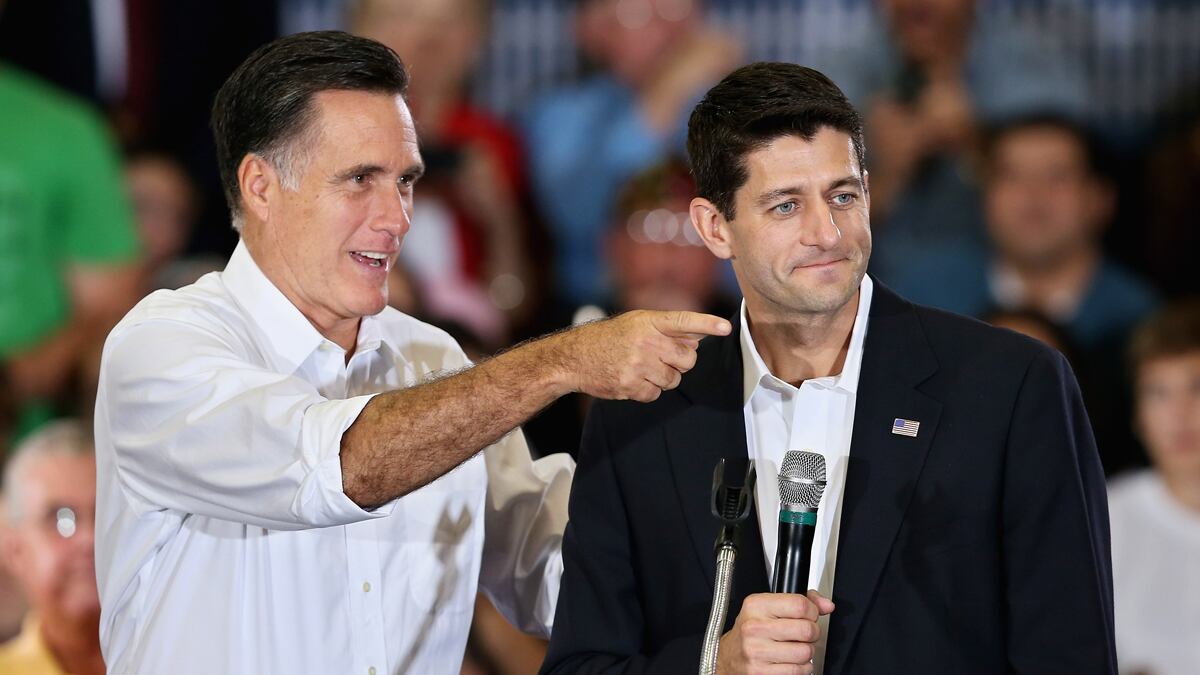Mitt Romney finally found a way to fire up the base—the other guy’s base. One needn’t venture beyond these pages to encounter gleeful liberal depictions of Romney’s new running mate, Paul Ryan, as an unhinged Randian plutocrat whose plans to kill Medicare (among other mustache-twirling villainies) will make him a “juicy target” for Obama and the Democrats this fall.

Romney’s introductory words were scarcely out of his mouth when the Obama campaign released an attack ad declaring that Paul Ryan’s “extreme” budget plan would mean catastrophe for women, the elderly, veterans, students, and middle-class families.
Some conservatives seem almost as happy as Democrats with the Ryan pick. They like Ryan’s youth, his smarts, his cheery optimism, and are thrilled by the signal that his selection makes: that Romney means to turn the Republican Party toward the small-government reform model that many activists envisioned in their three-year rebellion against the party establishment.
ADVERTISEMENT
The intellectual right, Ryan’s natural constituency, has convinced itself the selection of Ryan will finally elevate the presidential contest from sordid speculations about Romney’s taxes and business record to a serious, grown-up public conversation about the debt and deficit crises. The Wall Street Journal’s Gerald Seib believes that the Ryan pick “best guarantees the country will get the kind of philosophical debate worthy of a presidential campaign.”
Maybe. A likelier result is a turn further downward. Everyone up for a “zombie-eyed granny-starver from Wisconsin”?
Ryan himself is inclined to the belief that the fiscal problems facing the nation are so serious they cannot be effectively demagogued. When he was preparing his budget for the Tea Party Congress that was elected in 2010, he told me that his own six reelections in a Democratic district, despite his advocacy for entitlement reform, proved the point. “We will prove that the bark has no bite,” he said.
That is Romney’s gamble. According to reporting by my Newsweek colleague Dan Klaidman, the hope inside Romney’s campaign is that the Ryan pick will cast the Republican ticket as the bold team with real solutions to a serious problem, while Obama is the hapless steward of a stalled economy who has no plan to reduce debt or fix the deficit. The Romney camp believes that the coming battle over the Ryan reform plans will play out on the big-picture level, sharpening the philosophical distinctions between the two sides, rather then descending into a squabble about details—which loopholes and subsidies and entitlements will be cut, and for whom.
That seems like wishful thinking. Obama, who managed to ignore his own Simpson-Bowles commission precisely because the details were so politically toxic, seems hardly likely to spare the Ryan plan a thorough colonoscopy.
In choosing Ryan, Romney is no longer defending a vague set of ideas aligned with Ryan’s reform approach; he’s now taken on the thing itself, and will find himself spending the remainder of the campaign defending it, in all of its potentially damaging details. If entitlement reform is the third rail of politics, this is an entire third-rail transportation system.
The big advantage of having Ryan on the ticket is that he’ll have a huge national platform from which to explain his plan, and Ryan is much, much better at defending it than Romney is. Ryan is better than Romney at making the public argument on anything, as he showed Saturday morning in Norfolk, where he made the case for Romney’s time at Bain Capital in clearer, more forceful language than Romney himself has yet managed. “I’m proud to stand with a man who understands what it takes to foster job creation in our economy, someone who knows from experience, that if you have a small business—you did build that,” he said. “At Bain Capital, he launched new businesses and he turned around failing ones—companies like Staples, Bright Horizons, and Sports Authority, just to name a few. Mitt Romney created jobs and showed he knows how a free economy works.”
Ryan’s supporters credit their man with a Clintonian political skill, because, like Clinton, he has had to sell his ideas to voters not readily inclined to accept them. Karl Rove, speaking Saturday morning on Fox News, says he’s not worried about losing seniors over the Medicare issue because “Paul Ryan will be able to patiently explain to them what he and Governor Romney advocate.”
That would be a Clintonian achievement, indeed. But a fevered presidential race in its final 88 days is hardly the ideal environment for a careful explication of entitlement reform. John Boehner knew this, and avoided embracing the Ryan plan until his Republican majority in the House had been safely elected two years ago. It’s possible that seniors, and others, are ready for a thorough, elevating conversation about Medicare reform. But it would seem instructive to recall the special congressional election in New York last year, when Democrat Kathy Hochul won a “safe” Republican seat with the help of campaign ads showing a Paul Ryan lookalike pushing a wheelchair-bound granny off a cliff.
That may be precisely where Romney’s 2012 chances in Florida are now headed.





